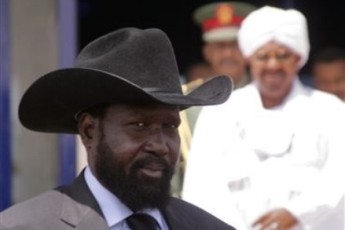Sudan & South Sudan set to resume post-secession talks
February 9, 2012 (KHARTOUM) – Sudan and South Sudan are due today to resume negotiations on a host of post secession issues amid a period of acrimony caused by repeated failures to resolve their oil dispute.

As negotiations floundered, Khartoum moved to seize southern oil, citing Juba’s failure to pay any fees since the south seceded from Sudan in July last year. In response, South Sudan accused Khartoum of stealing and suspended production of oil, the lifeline to both economies. Juba later moved to explore the possibility of another route.
The official spokesman of Sudan’s foreign ministry, Al-Obaid Adam Marawih, announced in Khartoum on Thursday that the country’s negotiating team led by Idris Abdul Gadir, the minister of the presidency of the Republic, has departed for the venue of the talks in the Ethiopian capital Addis Ababa.
Marawih said that beside oil, the two sides would discuss other issues including the demarcation of borders, trade and the situation of northerners and southerners in both countries.
The spokesman pointed out that the African Union High Level Panel (AUHIP), the facilitator of the talks, informed both parties that the upcoming round will last between 10 and 15 February.
The Sudanese diplomat indicated that his country prefers to start the next round from the point at which the last round ended, explaining that Khartoum expects Juba to sign the AUHIP proposal which obliges each side to refrain from unilateral actions and discuss other issues according to the negotiation basis outlined in previous rounds.
The AUHIP, led by former South African President Thabo Mbeki, presented a proposal to Sudan’s President Omer Al-Bashir and his South Sudanese counterpart Salva Kiir during the IGAD summit in Ethiopia last month.
The proposal, which aimed to reverse unilateral actions taken by both countries, suggests that the South pays its northern neighbour $4 billion over the next five years and sends 35,000 barrels per day to Khartoum’s refineries. In return, Khartoum would allow impounded tankers carrying South Sudan’s crude to sail out of Port Sudan.
In return, the Sudanese government would release the impounded oil tankers in Port Sudan carrying crude to their buyers.
With regards to the transit fees portion of the dispute, the positions of the two countries remained far apart as the South adamantly rejects Sudan’s demand of $32 per barrel, saying it will only pay a fee consistent with international norms.
The two leaders failed to sign the deal despite efforts by AUHIP mediators and other regional leaders including Ethiopia’s Prime Minister Meles Zenawi. Bashir, who said Kiir backed off at the last moment, later ordered the release of South Sudan’s seized oil as a gesture of good will.
But the Sudanese leader made a number of remarks this week suggesting that war between the two countries has become a possibility. He also accused South Sudan of having no intention to sign a deal on oil.
Marawih said that the last round focused entirely on the oil issue and failed because South Sudan did not sign. He also revealed that one of the issues that will be discussed is how to regularise the stay of southerners in Sudan and northerners in South Sudan.
This round of talks is also expected to tackle the issues of the contested region of Abyei and border demarcation. South Sudan’s official Pagan Amum warned this week that his country would not cede “a single inch” of its territories to Sudan. South Sudan also says it wants the status of Abyei to be included as part of the talks.
International community urged to push for resolution
Meanwhile, Global Witness, an international NGO, has called on the African Union, Chinese and Western governments to engage robustly with Sudan and South Sudan in order to reach an immediate resolution to the oil dispute during the talks.
“The AU, China, the US, UK, and Norway in particular must engage at the highest diplomatic levels to broker a deal between the two sides,” Global Witness campaigner Dana Wilkins said in a press release on Friday, warning that “the longer this dispute goes on and both economies continue to suffer, the more likely it is that the situation will escalate”.
(ST)
